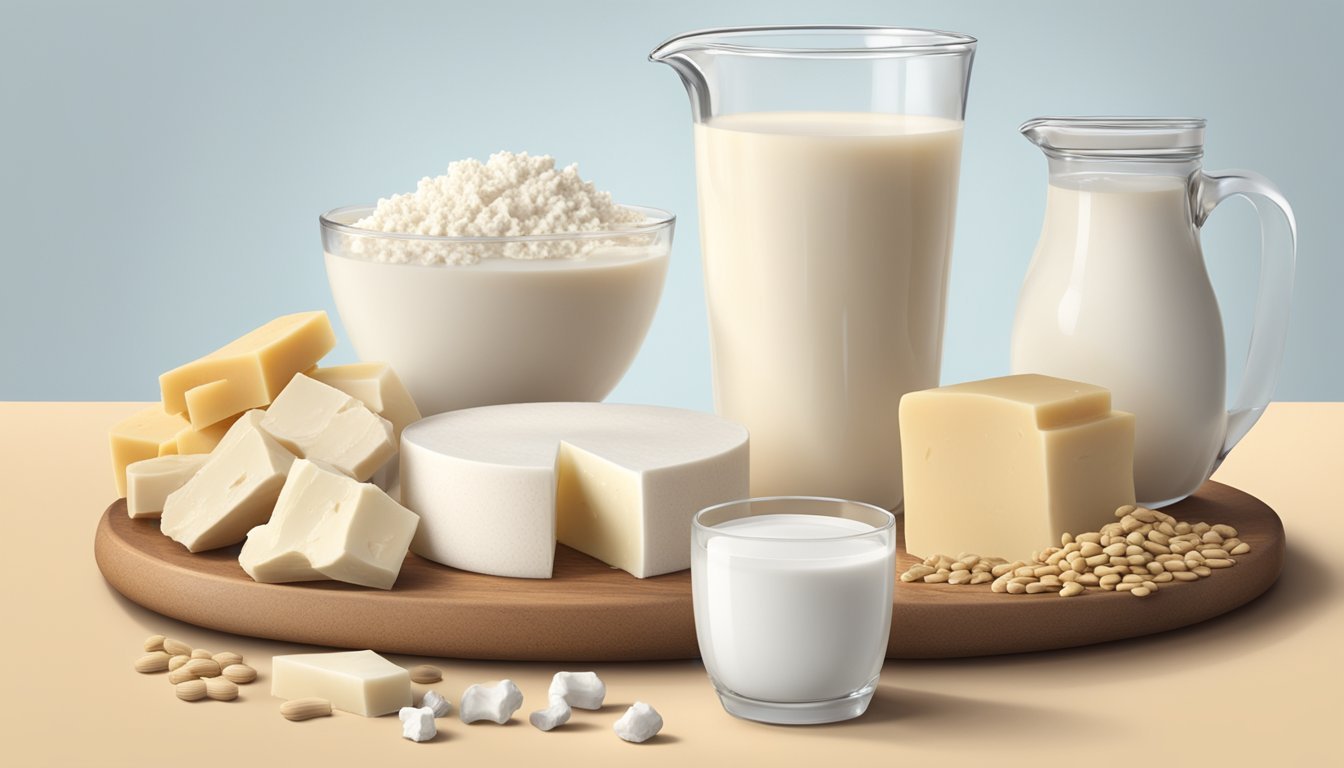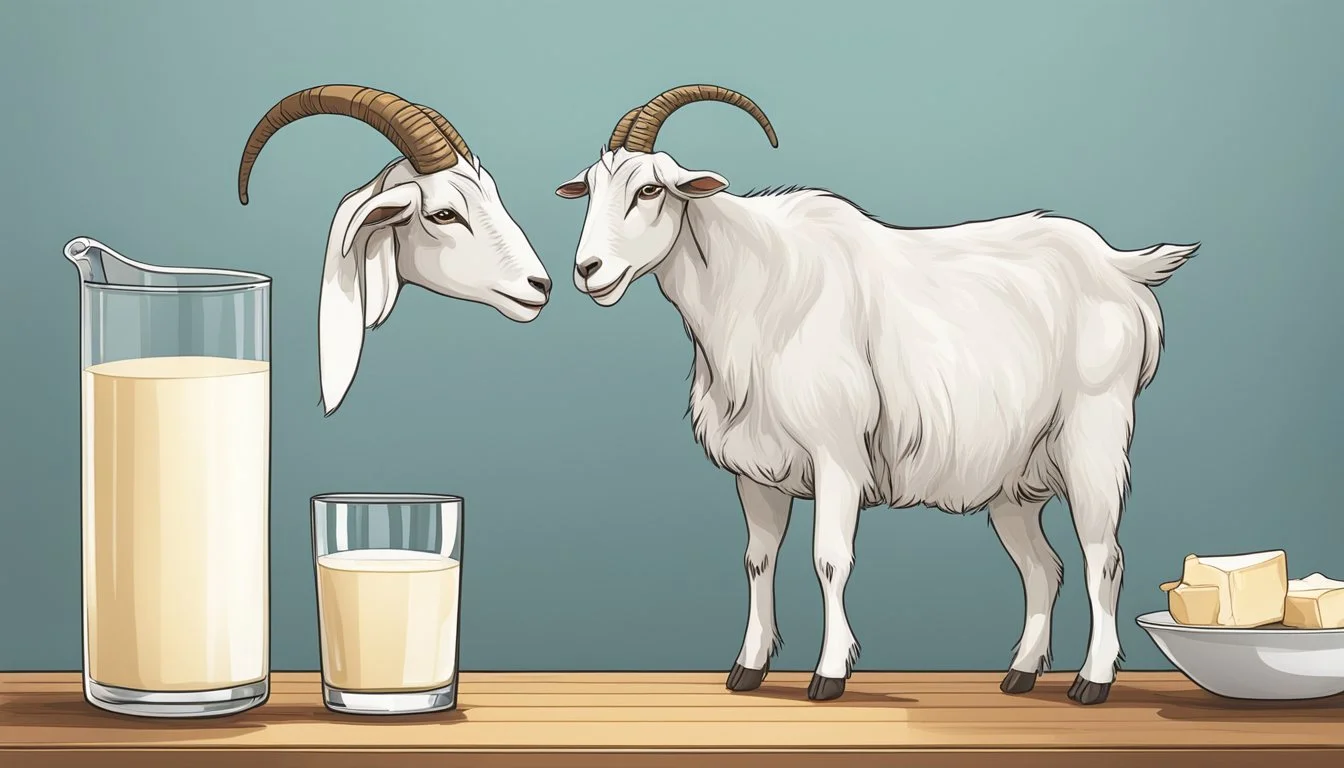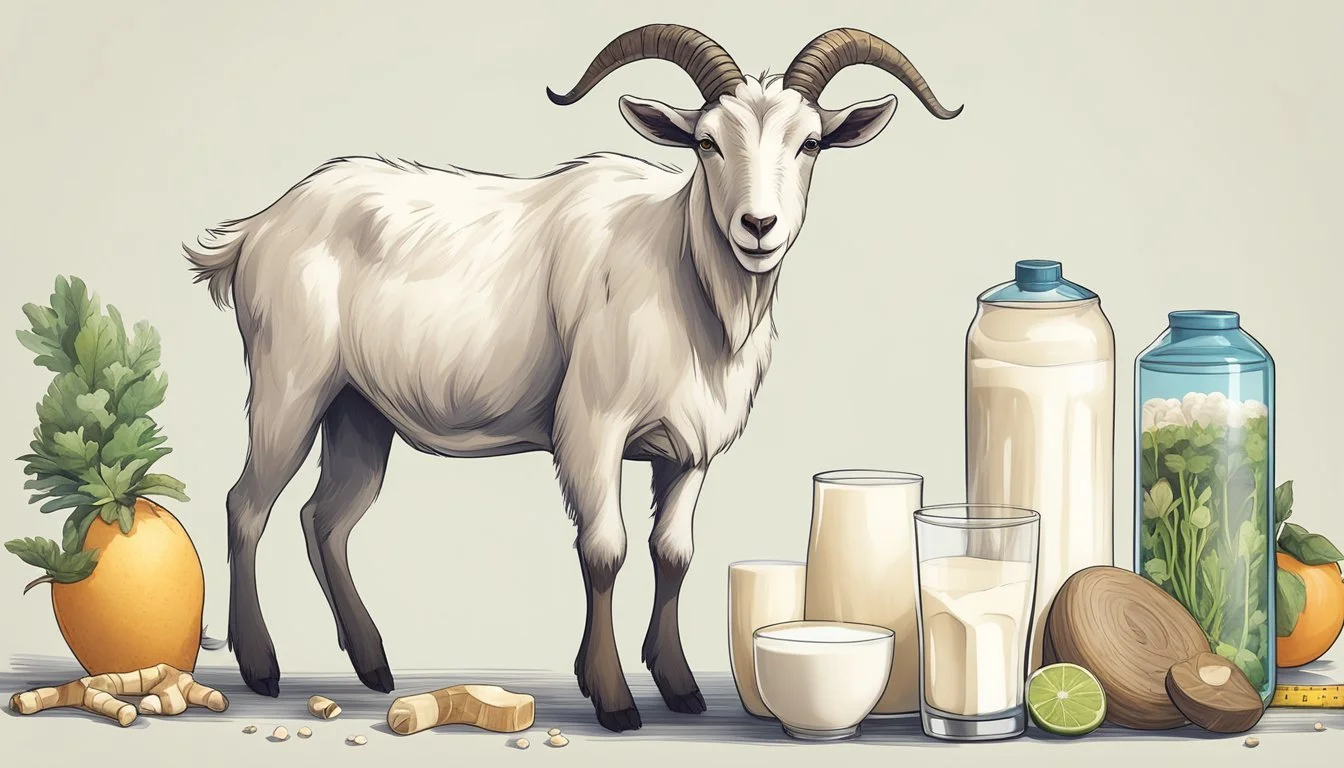The Connection Between Goat Milk and Bone Health
Unveiling Nutritional Benefits
Understanding the nutritional impact of various foods on bone health is crucial for maintaining skeletal integrity throughout one's lifetime. Goat milk, often considered an alternative to cow's milk, is gaining attention for its potential benefits related to bone health. It is packed with essential minerals like calcium, phosphorus, and magnesium, which are integral to bone formation and maintenance.
Scientific studies have explored the composition of goat milk and its influence on the body's mineral metabolism, including bone turnover. These studies suggest that goat milk may have favorable effects on bone density and overall bone health. In addition to minerals, goat milk contains vitamin A and vitamin D, both known for their roles in supporting bone health.
While cow's milk has traditionally been associated with healthy bones, goat milk is similarly rich in nutrients that are vital for bone strength. Its unique nutritional profile, including a variety of vitamins and minerals, can make it a valuable component of one's diet, especially in the context of bone health and growth. As interest in alternative dairy options continues to increase, goat milk stands out as a naturally nutrient-dense beverage that could contribute to stronger bones and overall skeletal well-being.
Nutritional Profile of Goat Milk
Goat milk offers a rich blend of essential nutrients contributing specifically to bone health, including a balance of vitamins and minerals, protein composition, and fats.
Vitamins and Minerals Essential for Bones
Goat milk provides a significant source of calcium, phosphorus, magnesium, and potassium, all micronutrients that are crucial for bone formation and maintenance. It also contains vitamin D and vitamin A, both vital for the absorption of calcium and phosphorus, and for supporting bone health.
Calcium: Essential for bone strength and density.
Phosphorus: Works in tandem with calcium to build strong bones.
Magnesium: Influences the bone matrix and helps with the absorption of calcium.
Potassium: May neutralize metabolic acids, which can help to preserve calcium and phosphorus in bones.
Vitamin D: Facilitates the absorption and regulation of calcium and phosphorus levels.
Vitamin A: Necessary for bone growth and remodeling.
Protein Composition in Goat Milk
The protein in goat milk is primarily made up of casein and whey protein, both of which contain all essential amino acids needed for the human body. These proteins are not just building blocks for body tissues, including bones, but are also believed to help with the absorption of calcium and other minerals.
Casein: Makes up the majority of goat milk protein, providing structural protein for bones.
Whey Protein: Comprises a smaller portion, containing lactalbumins and immunoglobulins, supporting bone health and the immune system.
Fat Content and Lipids in Goat Milk
Goat milk has a distinct profile of fat and lipids, which includes a balance of saturated fatty acids and unsaturated fats. Saturated fats are a source of fat-soluble vitamins that are key for bone health.
Fat: Includes both saturated and unsaturated fats that carry fat-soluble vitamins essential for bone health.
Lipids: Contains bioactive lipids that may aid in preventing bone demineralization.
The fatty acid composition of goat milk can aid the solubility and bioavailability of bone-strengthening minerals, making them more easily absorbed by the body.
Digestibility and Tolerance
In evaluating the health benefits of goat milk, its digestibility and how it is tolerated by those with lactose intolerance are of particular importance. Goat milk is reputed for being easier to digest and may be better tolerated by individuals with sensitivity to cow's milk.
Lactose Intolerance and Goat Milk
Goat milk contains slightly less lactose than cow's milk, which can make it a more suitable alternative for those with lactose intolerance. For individuals who have difficulty digesting lactose, the lactose in goat milk still requires careful consideration, even though some find they can tolerate it better than lactose from other types of milk.
Digestive Benefits of Goat Milk
Probiotics and digestion-enhancing properties are significant contributors to goat milk's growing popularity. The protein structure of goat milk allows it to form a softer curd during the digestive process, which may help in improving digestion. Moreover, goat milk may have a beneficial effect on gut health, although it doesn't typically contain probiotics unless they are added during processing.
Bone Health Basics
Optimal bone health involves maintaining adequate bone mineral density and ensuring continuous bone remodeling to preserve bone strength throughout life. Here, the process of how the body manages bone mineral mass and reacts to hormonal changes will be explored.
Understanding Bone Mineral Density
Bone health is closely tied to bone mineral density (BMD), which is a measure of the concentration of minerals, primarily calcium and phosphorus, in a defined volume of bone. It reflects the strength and density of bones and serves as a key indicator in diagnosing osteoporosis. Higher BMD values are typically associated with stronger bones, while low BMD can indicate increased risk of fractures.
Bone Mass and Remodeling
Bone mass, a component of bone health, reaches its peak in early adulthood and then stabilizes for a period before naturally declining with age. The body balances bone formation and bone loss through a continuous process known as bone remodeling. This process includes bone resorption by osteoclasts (cells that break down bone) and bone formation by osteoblasts (cells that build bone), ensuring bone homeostasis—the state of equilibrium in bone health.
The Role of Parathyroid Hormone
Parathyroid hormone (PTH) plays a crucial role in regulating bone metabolism. It is produced by the parathyroid glands and its secretion increases when blood calcium levels are low. PTH promotes the release of calcium from bones into the bloodstream and modulates bone turnover rate, influencing both bone growth and remodeling activities. Adequate levels of PTH are essential for maintaining a balance between bone mineral mass and bone health.
Benefits of Goat Milk for Bone Health
Goat milk is notable for its high calcium content, which is pivotal for developing and maintaining strong bones. It is a beneficial dietary addition for enhancing bone strength and mineral content.
Increasing Peak Bone Mass
Children, adolescents, and young adults can benefit from incorporating goat milk into their diet as it is rich in calcium, a key nutrient for attaining peak bone mass. This is the highest level of bone mass a person can achieve and is crucial since it sets the foundation for bone health later in life. A diet that includes goat milk contributes to the dietary calcium needed during these formative years, supporting optimal bone development.
Preventing Osteoporosis and Fractures
The calcium intake from goat milk not only contributes to achieving peak bone mass but also plays a role in preventing osteoporosis and fractures, especially the common and serious hip fracture. Osteoporosis is characterized by porous bones and an increased fracture risk. Regular consumption of goat milk provides a dietary means of bolstering bone strength and can act as a preventive measure against osteoporosis-related fractures.
Comparing Goat Milk with Other Dairy Products
When examining the impact of dairy products on bone health, it's important to consider how different types of milk and dairy-derived items like yogurt and cheese contribute to bone density and overall nutrition. The dairy matrix of these foods plays a crucial role in delivering essential nutrients.
Cow Milk versus Goat Milk
Goat milk is often compared to cow milk due to their nutritional similarities and differences. Goat milk is known for its higher content of certain minerals and vitamins essential for bone health. For instance, it provides more calcium, phosphorous, magnesium, and vitamin A, all integral to bone health and density. When assessing dairy intake for bone health, one finds that goat milk contains more protein and fat compared to cow milk, with less lactose, which may be beneficial for those with mild lactose sensitivities.
A table depicting the nutrient comparison of goat milk and cow milk:
Protein: Goat Milk - Higher, Cow Milk - Lower
Fat: Goat Milk - Higher, Cow Milk - Lower
Calcium: Goat Milk - Higher, Cow Milk - Lower
Vitamin A: Goat Milk - Higher, Cow Milk - Lower
Lactose: Goat Milk - 1% less, Cow Milk - 1% more
Yogurt, Cheese, and Fermented Products
The dairy matrix of fermented dairy products such as yogurt, cheese, and fermented milk alters the availability and absorption of nutrients. Goat milk can be transformed into these products with varying nutritional profiles compared to their cow milk counterparts. Goat milk yogurt and cheese contain the beneficial nutrients of goat milk and also provide probiotics and live cultures that support digestive health.
Fermented goat milk, like kefir, combines the nutrient-rich profile of goat milk with the added benefits of fermentation, which may aid in enhancing the absorption of bone-building minerals. The fat and protein content of goat milk makes for a richer texture in cheese and yogurt, affecting flavor and consistency, which can influence consumer preference.
In summary, while both goat and cow milk contribute valuable nutrients to the diet, goat milk may offer a nutritional edge for individuals looking to optimize their daily dairy intake for bone health, especially for those seeking alternatives due to lactose sensitivity or preference for the taste and texture of goat milk products.
Effect of Diet and Lifestyle
Diet and lifestyle choices are critical determinants in maintaining bone health throughout a person’s life. Adequate intake of key nutrients and regular physical activity are fundamental in building and preserving strong bones.
The Impact of Overall Nutrition
A balanced diet rich in proteins, calcium, and other minerals plays a significant role in promoting bone health. Daily protein intake is essential, as bones are made up of a protein matrix that provides structure. However, not all proteins are equal. For example, incorporating goat milk into one's diet can be beneficial due to its potential to influence bone and mineral metabolism positively. In contrast to purely caloric intake, the quality of calories consumed is paramount.
Fruits and vegetables are also vital, providing the body with nutrients and carbohydrates, which serve as energy sources without overburdening the body with excess calories. Nutrition dense in these whole foods supports the body’s structural requirements and aids in the management of body weight, which can influence bone density.
Physical Activity's Role in Bone Health
Physical activity, particularly weight-bearing and strength-training exercises, is essential for building and maintaining bone density. Engaging in regular physical activity stimulates bone formation and slows age-related bone loss. The force of muscles pulling against bones stimulates bone strengthening, making activities such as walking, running, and lifting weights particularly effective.
Furthermore, balance and flexibility exercises help prevent falls that can cause bone fractures, underlining the importance of an active lifestyle alongside nutrition to support bone health. It's recommended for individuals to integrate ample physical activity into their daily routine to ensure optimal bone health throughout their lifespan.
Clinical Evidence and Research
The body of evidence from randomized controlled trials and systematic reviews offers substantial insights into the relationship between goat milk consumption and bone health. These studies harness the Medline database as a primary source for their literature search, providing a robust platform for scholarly research.
Analyzing Randomized Controlled Trials
Randomized controlled trials (RCTs) serve as the gold standard for evaluating the efficacy of interventions like goat milk as a potential therapy for improving bone health. These trials typically involve comparing the health outcomes in a group receiving goat milk to those in a placebo group. The National Osteoporosis Foundation often cites such RCTs as they provide strong evidence due to the methodology's ability to reduce bias and confounding factors.
Observational Studies and Systematic Reviews
Observational studies engage in closely monitoring participants' dietary habits, including goat milk intake, and correlating these with bone health markers over time. Conversely, systematic reviews aggregate data from multiple studies, including both RCTs and observational studies, to present a comprehensive picture of existing evidence on the topic. The reviews conduct thorough systematic literature searches to ensure that all relevant studies are considered, which allows for a more neutral and clear assessment of the connection between goat milk and bone health.
Additional Considerations in Goat Milk Consumption
When incorporating goat milk into one's diet, it is important to consider potential health risks, its impact across different age groups, and how consumption patterns vary globally.
Addressing Possible Health Risks
Food Safety: Goat milk consumption requires careful consideration of food safety standards. Unpasteurized milk can harbor harmful bacteria, making pasteurization a crucial step to ensure safety. Moreover, individuals who have allergies to dairy products should exercise caution, as goat milk contains allergens similar to cow's milk.
Cholesterol and Blood Pressure: Those monitoring cardiovascular health must acknowledge that goat milk, just like other dairy products, contains cholesterol. However, goat milk has been associated with beneficial effects on blood pressure and may offer a more favorable fat profile when compared to cow's milk.
Relevance in Different Age Groups
Infants: It is not recommended to feed undiluted cow or goat milk to infants due to high protein and mineral content which can stress immature kidneys.
Children: Goat milk can be a nutritious part of children's diets, providing essential vitamins and minerals conducive to growth, but it should be introduced carefully and in consultation with a healthcare provider.
Middle-Aged to Older Adults: For them, the balance of nutrients in goat milk may support bone health and assist in maintaining calcium levels within the body.
Global Dairy Consumption Patterns
United States: Dairy consumption, including goat milk, is common, with a focus on fortified products to enhance nutrient intake.
Bangladesh and Pakistan: In these areas, goat milk is a staple in the diet of many, often consumed in its natural form, and it plays a significant role in daily nutrition.
Sodium Content: One should also be mindful of sodium content, particularly for those with hypertension, as all dairy products contain inherent levels of sodium.
It's imperative to consider these aspects of goat milk consumption to make informed dietary choices tailored to individual health needs and cultural contexts.
Recommendations for Goat Milk Intake and Bone Health
Goat milk is notable for its nutritional content and potential benefits for bone health. It offers a desirable mix of essential nutrients beneficial for maintaining strong bones.
Daily Requirements and Dietary Guidelines
To support bone health, individuals should meet the Recommended Dietary Allowance (RDA) for calcium and other nutrients. Adults generally require about 1,000 mg of calcium per day, which can increase to 1,200 mg for women over 50 and men over 70. Goat milk can contribute to meeting these needs, as it contains approximately 327 mg of calcium per cup. It's important for consumers to consider goat milk as part of the total dietary intake and not rely solely on it for their calcium needs, ensuring balance with other sources of nutrition.
Incorporating Goat Milk in a Balanced Diet
Goat milk can be integrated into the diet in various forms – as a drink, in cheese, or yogurt. Given its nutrient-rich profile, it can serve as a valuable addition to one's diet with the following points in view:
Regularly include goat milk or its products as one part of a varied diet that includes other calcium sources such as green leafy vegetables and fortified foods.
For individuals who do not consume dairy, calcium supplements may be considered to meet their RDA. However, relying on food sources like goat milk is generally preferred due to the additional benefits of other compounds like magnesium and phosphorus.
It's essential to pair goat milk consumption with a balanced diet that also emphasizes vitamin D intake, either through diet or sun exposure, to support calcium absorption and bone health.
Future Directions and Potential Research
Advancements in the study of goat milk are instrumental for enhancing human bone health. This section explores upcoming innovations and the necessity for further research to extend our understanding of goat milk's impact.
Innovations in Dairy Farming and Processing
Dairy farming has the potential to optimize the quality of goat milk through advanced breeding techniques and feed composition, directly influencing the milk's nutritional profile. Innovative processing methods, such as the development of specialized filtration and pasteurization techniques, could preserve or even enhance the bioactive compounds in goat milk that are crucial for bone health.
Identifying Areas for Further Study
Further research is critical for a deeper comprehension of how goat milk affects bone density and development. Studies should focus on:
Longitudinal Clinical Trials: Conducting extensive clinical trials over longer periods to monitor the direct impact of goat milk consumption on different age groups and demographics.
Molecular Analysis: Investing in molecular analysis to understand how goat milk's unique protein structure contributes to its ability to promote bone health compared to other types of milk.








